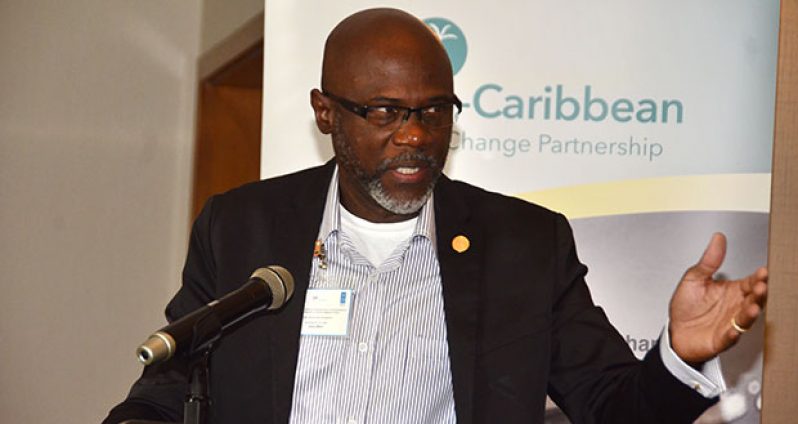–to set foundation for Nationally Appropriate Mitigation Actions
By Svetlana Marshall
GUYANA, under the Japan-Caribbean Climate Change Partnership (J-CCCP), is set to conduct a gap analysis of its Climate Change Framework as it sets the foundation for the development of Nationally Appropriate Mitigation Actions (NAMAs).This is according to Rear Admiral (rtd) Gary Best – the Presidential Advisor on the Environment, who was at the time delivering remarks during a J-CCCP Capacity Building Training Seminar on

the Development and Implementation of Climate Mitigation Actions at the Marriott Hotel on Thursday.
The workshop is in support of the United Nations Development Programme (UNDP) Low Emission Capacity Building (LECB) Programme and the United Nations Framework Convention on Climate Change Regional Collaboration Centre (UNFCCC RCC).
Rear Admiral Best, in making his presentation, noted that under the J-CCCP initiative Guyana will be equipped with the requisite skills and knowledge needed for the establishment of a National Adaptation Plan which will include a gap analysis.
This will ensure that the country’s strategies are aligned with the UN’s Framework Convention on Climate Change Adaptation Plans. It will also set the foundation for the establishment of NAMAs.
NAMAs refer to any action that reduces emissions in developing countries and is prepared under the umbrella of a national governmental initiative. These can include policies directed at transformational change within an economic sector, or actions across sectors for a broader national focus. Notably, NAMAs are supported and enabled by technology, financing, and capacity building aimed at achieving a reduction in emissions relative to ‘business as usual’ emissions in 2020.
Rear Admiral Best further noted that the seminar is the first step in the process of preparing the country for the creation of NAMAs.
According to him, the development of NAMA presents opportunities for innovation.
“We anticipate that these mitigating actions will result in low emissions development, increased energy supply, food security, public health, social equity and cultural preservation for our citizens.”
In moving forward, the Presidential Advisor on Environment said it is important for all stakeholders to participate in the process, singling out the private sector, which according to the UN, will account for over 80 per cent of the finance needed to tackle climate change.
“In that context, the Government of Guyana sees opportunities for the private sector to contribute to climate change solution through mitigation in the areas renewable energy, energy efficiency, energy conservation, waste management, clean technology transfer and capacity enhancement and carbon markets,” Best said.
PILOT PROJECTS
In addition to preparing Guyana NAMAs, Guyana under the J-CCCP initiative will receive support for the implementation of two pilot projects in Regions Seven and Nine.
Region Seven has been identified for a pilot project in alternative energy sources and Region Nine for a water resources management pilot project.
However, despite the gaps in the system, Best noted that since Guyana’s ratification of the UN’s Framework Convention on Climate Change in 1994, the country has made significant achievements.
“Even though the Government of Guyana did not develop any NAMAS, it is important to highlight that Guyana showed international leadership, through the preparation and implementation of its Low Carbon Development Strategy, based on its forests assets, as an interim REDD+ mechanism for climate change mitigation,” he pointed out.
The country, however, is transitioning from LCDS to a green economy pathway which includes a multi-sectorial low emission contribution to climate change mitigation and adaptation.
The green economy will be modeled through the greening of the town Bartica.
“While acknowledging these accomplishments and recognising that mitigation is a pathway to climate change solution for a developing country, there still exist gaps in our current national efforts as the country seeks to address risks and vulnerability to climate change,” he emphasised.
UNDP Deputy Resident Representative Shabnam Mallick, who was also present during the opening of the two-day workshop, said the seminar is a critical step towards countries development of the Climate Mitigation Actions, including NAMAs.
“It aims to provide direct capacity building in the implementation of countries’ Nationally Determined Contributions (NDCs) for national priority sectors in keeping with the Paris Agreement on Climate Change,” Mallick explained while offering her congratulations to Guyana for its ratification of the Paris Agreement.
J-CCCP, which was officially launched in January, aims to support eight Caribbean countries towards inclusive, low-emission, risk-resilient development by improving their energy security.
It also aims to integrate medium to long-term planning for adaptation to climate change with national development planning and budget processes, the UNDP Deputy Resident Representative added.
These countries include the Commonwealth of Dominica, Grenada, St Lucia, St Vincent and the Grenadines, Jamaica, Belize, Suriname and Guyana.



.jpg)









